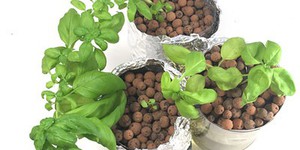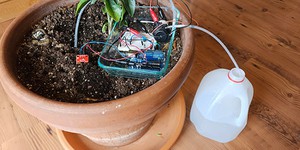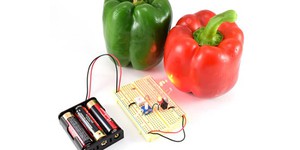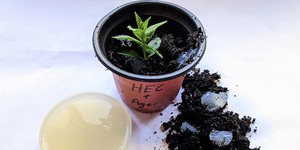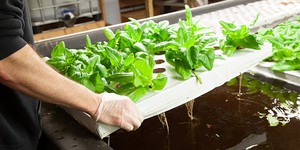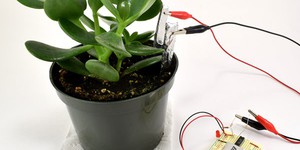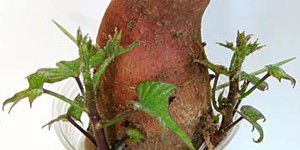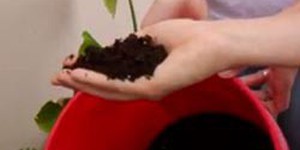Agricultural Technology Science Projects (14 results)
How will we feed the world population by the year 2050? The United Nations projects that by 2050 the world population will have risen to 9.7 billion people—more than 2 billion more people than today! To feed everyone, we will need a lot more food, which makes agricultural technology incredibly important. Agricultural technology is the use of science, engineering, and technology to make agriculture (farming) better. This can mean a wide range of things, including preventing plant diseases, gathering data to optimize crop yield (the amount of food you can grow on a piece of land), using resources like water more effectively, or even creating more nutritious versions of a vegetable!
Try one of the projects below to explore some of the solutions farmers, researchers, and engineers are trying around the world. Maybe you'll be working alongside them one day making sure we can feed everyone.
|
Select a resource
Sort by
|
What do plants need to grow? Most of us would answer that they need light, air, water, and soil. But by using a process called hydroponics, you can grow plants without soil! How does it work? Try this project and see for yourself!
Read more
Featured
Have you heard that garlic powder is supposed to inhibit the growth of bacteria? Which do you think would make a better disinfectant: a solution of garlic powder or a solution of bleach? This project shows you a straightforward way to compare the effectiveness of different disinfectants (or other antimicrobial agents), by measuring zones of inhibition on a culture plate.
Read more
Have you ever taken care of a plant? It can be tricky to get it right. You have to remember to water it regularly, and you also have to make sure to give it the right amount of water — not too much or too little. What if technology could help? In this engineering project, you will learn how to automate the entire process of watering a plant. Using a soil moisture sensor and a pump, you will build a circuit that will automatically detect when the soil is too dry, add water, and stop when…
Read more
New
Have you ever noticed that on a hot day, it's more comfortable to wear a light-colored shirt than a dark one? Or that it's cooler in a park than walking down a street? This happens because different surfaces absorb and reflect heat in different ways. Urban heat islands are parts of cities where man-made surfaces like pavement and buildings replace natural surfaces like grass and trees. In this project, you will use temperature and satellite data to see if certain areas in a city have higher…
Read more
When you go to the supermarket, how do you pick out ripe fruits and vegetables? You might look at their size or color, or feel them for firmness. That might be easy to do when you pick out a half dozen apples, but imagine if you had to examine thousands of apples growing in a field, or strawberries coming down a conveyor belt getting ready for packaging. Suddenly, it is a lot harder to do yourself! What if a machine could pick and sort the produce for you? In this project, you will address part…
Read more
Water is a valuable resource, and water shortages are a serious problem in many parts of the world. The problem can be made worse by people who waste water; for example, by watering a garden or using sprinklers on their lawn (or a farmer taking care of an entire field) when it has rained recently or the soil is already moist. How can you help conserve water and prevent such waste? One way is to build an electronic soil moisture sensor. This project will show you how to build a circuit that…
Read more
Growing crops takes a huge amount of water. That same water is also needed for drinking, bathing, and other industries. In dry climates or lands experiencing drought, there is a big push to conserve (save) water as much as possible. In this project you will experiment with creating environmentally friendly jelly-like materials called hydrogels and see if they can help soil retain water thus reducing the amount of water needed to grow crops.
Read more
New
Artificial intelligence (AI) programs can now generate photorealistic pictures of people who do not exist in the real world. How can you tell if a picture is of a real person or a fake, AI-generated person? What features of the picture do people use to decide whether the face is real or AI-generated? In this project, you will explore these questions as you ask volunteers to look at both real and AI-generated pictures of human faces.
Read more
How are we going to feed the more than 9 billion people that will live on Earth by 2050? This is a major question for farmers, ranchers, and food scientists around the globe. It's a big problem, considering that from 2017 to 2050 we will be adding 1.5 billion people and need 20% more food. Linked to this problem of producing enough food is having enough land, water, and other natural resources to make that happen. The final solution will surely be made up of many different approaches working…
Read more
Do you or your family have a lawn, garden, or potted plants that you water regularly? Irrigation—or the artificial application of water to plants and landscaping—accounts for over two-thirds of the world's freshwater consumption (U.S. Geological Survey, 2016)! While that total includes farms, in the United States landscape irrigation still accounts for almost one-third of residential water use. As much as half of that water is wasted due to inefficient watering methods (WaterSense,…
Read more
Have you ever enjoyed eating a tasty sweet potato? They can be served as yummy mashed sweet potatoes with melted butter, turned into golden-brown sweet potato fries, or prepared in many other scrumptious ways. Did you know that you can make a sweet potato grow into a sweet potato plant, and grow several sweet potatoes this way? In this science project, you will grow your own sweet potato plants and investigate what part of the sweet potatoes is needed to grow the plants.
Read more
Can you imagine Valentine's Day or Halloween without chocolate? Well, if you're a chocolate lover
brace yourself for the bad news. According to the United States Department of Agriculture (USDA), "Worldwide
demand for cacao now exceeds production." If there isn't enough cacao, the major raw ingredient for
chocolate, then the chocolate supply will dwindle. Hang on! Before you start rushing to the store to buy
all the chocolate you can get your hands on, a solution is already in the works. In…
Read more
Every day farmers around the world apply commercial fertilizer to their fruits and vegetables to improve plant health and yield. But applying commercial fertilizer is expensive and not economically possible for some farmers in developing countries. What if they could find a way to fertilize plants cheaply? It turns out that human urine is rich in the nutrients that plants need to grow. Could urine serve as a fertilizer substitute? Find out for yourself in this plant growth science project.
Read more
|


